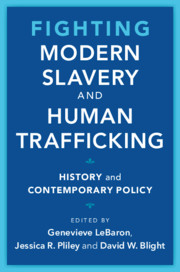Book contents
- Fighting Modern Slavery and Human Trafficking
- Slaveries since Emancipation
- Fighting Modern Slavery and Human Trafficking
- Copyright page
- Contents
- Figures
- Tables
- Contributors
- Preface
- Acknowledgments
- Abbreviations
- 1 Introduction
- 2 Counting Modern Slaves
- 3 Working Analogies
- 4 Free Soil, Free Produce, Free Communities
- 5 Ambivalent Abolitionist Legacies
- 6 Mexico’s New Slavery
- 7 Undermining Labor Power
- 8 A Market in Deception? Ethically Certifying Exploitative Supply Chains
- 9 Preventing Human Trafficking
- 10 Integrated and Indivisible
- Afterword If There Is No Struggle, There Is No Progress
- Index
5 - Ambivalent Abolitionist Legacies
The League of Nations’ Investigations into Sex Trafficking, 1927–1934
Published online by Cambridge University Press: 18 June 2021
- Fighting Modern Slavery and Human Trafficking
- Slaveries since Emancipation
- Fighting Modern Slavery and Human Trafficking
- Copyright page
- Contents
- Figures
- Tables
- Contributors
- Preface
- Acknowledgments
- Abbreviations
- 1 Introduction
- 2 Counting Modern Slaves
- 3 Working Analogies
- 4 Free Soil, Free Produce, Free Communities
- 5 Ambivalent Abolitionist Legacies
- 6 Mexico’s New Slavery
- 7 Undermining Labor Power
- 8 A Market in Deception? Ethically Certifying Exploitative Supply Chains
- 9 Preventing Human Trafficking
- 10 Integrated and Indivisible
- Afterword If There Is No Struggle, There Is No Progress
- Index
Summary
Contemporary abolitionists frequently turn to anti-slavery abolitionism for inspiration. This chapter argues that they should look to the more ambivalent legacy of anti-prostitution abolitionism in order to learn from earlier mistakes. It examines the League of Nation’s investigations into global sex trafficking in the interwar period to explore what the study of anti-trafficking abolitionism can reveal to contemporary activists and policymakers. It suggests that anti-prostitution abolitionist campaigns of the 1920s and 1930s warn of the oversized influence of philanthropists on the construction of global agendas; the dangers of the Global North shaping the terms of international knowledge production that become implicated with racialized understandings of trafficking; the (un)intended outcomes of stricter border control and empowered carceral systems that target women assumed to be migratory prostitutes.
Keywords
- Type
- Chapter
- Information
- Fighting Modern Slavery and Human TraffickingHistory and Contemporary Policy, pp. 97 - 118Publisher: Cambridge University PressPrint publication year: 2021
- 1
- Cited by

